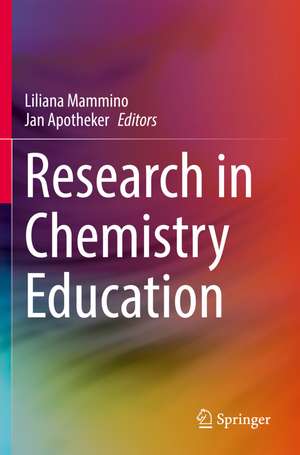Research in Chemistry Education
Editat de Liliana Mammino, Jan Apothekeren Limba Engleză Paperback – 19 mai 2022
The chapters in this book describe new teaching approaches, approach-explorations and in-class activities, analyse educational challenges and possible ways of addressing them and explore cross-discipline possibilities and their potential benefits for chemistry education.
This makes the volume an up to date compendium for chemistry educators and educational researchers worldwide.
| Toate formatele și edițiile | Preț | Express |
|---|---|---|
| Paperback (1) | 636.12 lei 6-8 săpt. | |
| Springer International Publishing – 19 mai 2022 | 636.12 lei 6-8 săpt. | |
| Hardback (1) | 642.18 lei 6-8 săpt. | |
| Springer International Publishing – 18 mai 2021 | 642.18 lei 6-8 săpt. |
Preț: 636.12 lei
Preț vechi: 748.38 lei
-15% Nou
Puncte Express: 954
Preț estimativ în valută:
121.72€ • 125.58$ • 101.58£
121.72€ • 125.58$ • 101.58£
Carte tipărită la comandă
Livrare economică 27 martie-10 aprilie
Preluare comenzi: 021 569.72.76
Specificații
ISBN-13: 9783030598846
ISBN-10: 3030598845
Ilustrații: XVI, 189 p. 40 illus.
Dimensiuni: 155 x 235 mm
Greutate: 0.3 kg
Ediția:1st ed. 2021
Editura: Springer International Publishing
Colecția Springer
Locul publicării:Cham, Switzerland
ISBN-10: 3030598845
Ilustrații: XVI, 189 p. 40 illus.
Dimensiuni: 155 x 235 mm
Greutate: 0.3 kg
Ediția:1st ed. 2021
Editura: Springer International Publishing
Colecția Springer
Locul publicării:Cham, Switzerland
Cuprins
Chapter 1. Globalization of chemistry education in Africa: Challenges and opportunities.- Chapter 2. Achieving the aims of practical work with microchemistry.- Chapter 3. Chemistry for the masses: the value of small scale chemistry to address misconceptions and re-establish practical work in diverse communities.- Chapter 4. The Systemic Approach to Teaching and Learning Organic Chemistry (SATLOC): Systemic Strategy for Building Organic Chemistry Units.- Chapter 5. Are our students learning and understanding Chemistry as intended? Investigating the level of prior knowledge of UNIVEN students for the 2nd year Inorganic Chemistry module.- Chapter 6. Are the newly formed Kenyan Universities ready to teach externally examined diploma courses in analytical chemistry?.- Chapter 7. “Closing the Circle” in Student Assessment and Learning.- Chapter 8. Interpretation and translation of chemistry representations by grade 11 pupils in the Chipata district, Zambia.- Chapter 9. The project IRRESISTIBLE: Introducing cutting edge science into the secondary school classroom.- Chapter 10. Chemistry teaching and chemical education research: 30 year experience in integration pathways.- Chapter 11. Teaching Modern Physics to Chemistry Students.- Chapter 12. Learning about green chemistry independently: Students’ point of view.- Chapter 13. Chemistry education in Africa: investigating the challenges and designing for the future.
Notă biografică
Liliana Mammino is professor emeritus in the School of Mathematical and Natural Sciences of the University of Venda (UNIVEN, South Africa). She completed her 5-year chemistry degree at the University of Pisa (Italy) and her PhD at Moscow State University (Russia), with theoretical chemistry theses in both cases. Her work experience includes working in the Departments of Chemistry at the National University of Somalia (1974 - 1975), University of Zambia (1988 - 1992), National University of Lesotho (1993 - 1996) and UNIVEN since 1997, teaching general chemistry and physical chemistry courses and, at UNIVEN, also the process technology course. Her research interests comprise theoretical/computational chemistry (with particular focus on the computational study of biologically active molecules) and chemistry education (with particular focus on conceptual understanding, the role of language in science learning, and green chemistry education). She has published extensively in both areas. Sheis a titular member in Division III of IUPAC and representative of Division III at the IUPAC Interdivisional Committee on Green Chemistry. She was a recipient of the IUPAC award for Distinguished Women in Chemistry and Chemical Engineering in 2013
Jan Apotheker retired in December 2016 as lecturer in science education at the University of Groningen, where he was involved in training both secondary school teachers as well as the faculty staff. Between 2014 an 2016 he coordinated the FP-7 project’Irresistible’. in which State of the art science research was introduced in the science classroom. He is chair of the Committee on Chemistry Education of IUPAC, and chief editor of ‘Chemistry Teacher International’.
Textul de pe ultima copertă
This volume emphasizes the role of chemical education for development and, in particular, for sustainable development in Africa, by sharing experiences among specialists across the African continent and with specialists from other continents. It considers all areas and levels of chemistry education, gives specific attention to known major challenges and encourages explorations of novel approaches.
The chapters in this book describe new teaching approaches, approach-explorations and in-class activities, analyse educational challenges and possible ways of addressing them and explore cross-discipline possibilities and their potential benefits for chemistry education.
This makes the volume an up to date compendium for chemistry educators and educational researchers worldwide.
This makes the volume an up to date compendium for chemistry educators and educational researchers worldwide.
Caracteristici
Explores the teaching and learning of chemistry across the African continent Presents the best papers from the Second African Conference on Research in Chemistry Education Provides examples of classroom activities and teaching strategies in chemistry education
